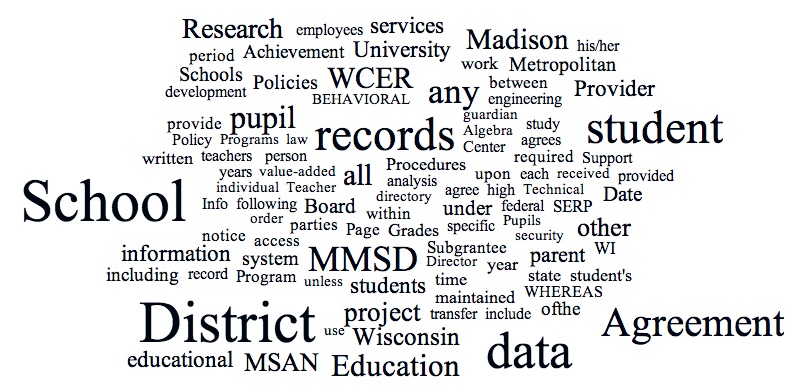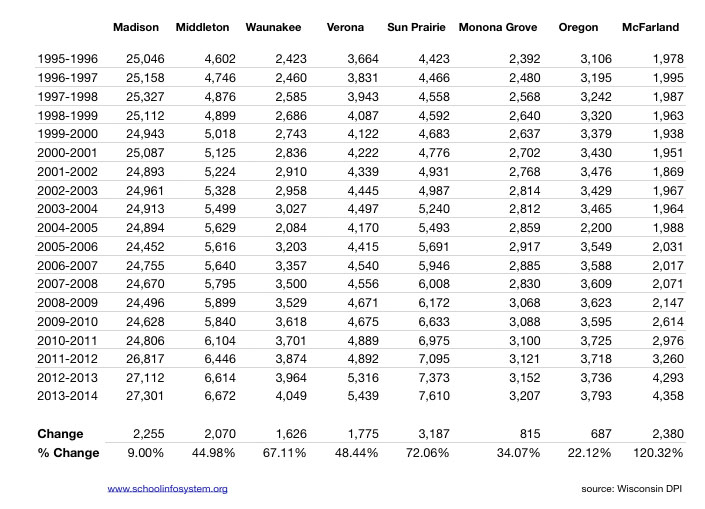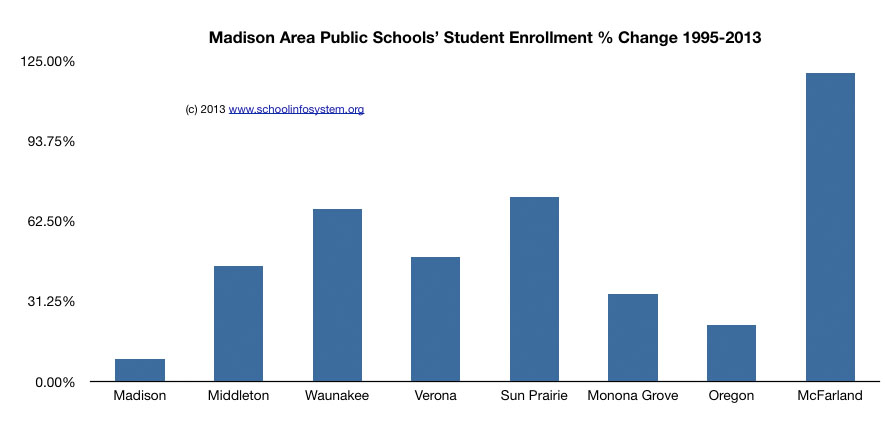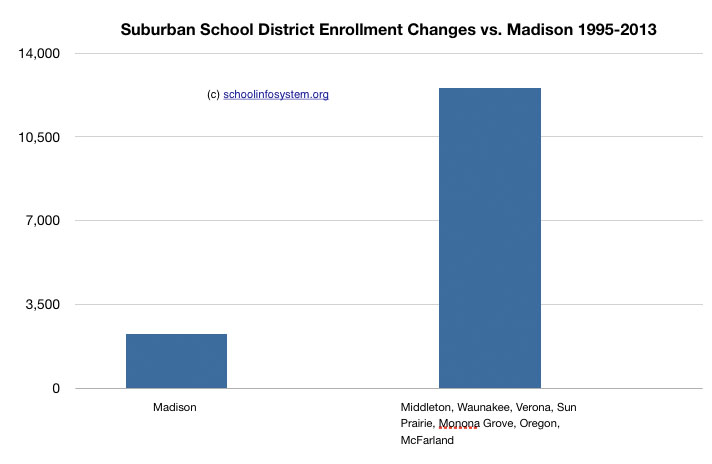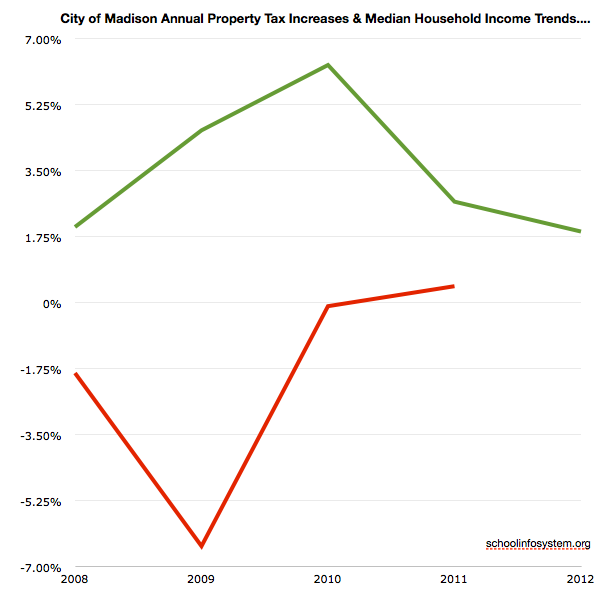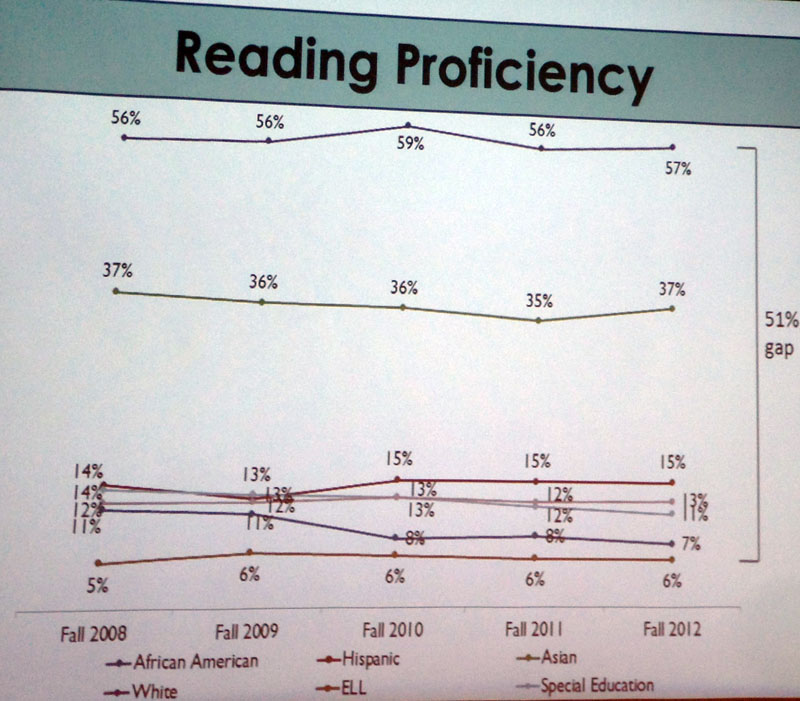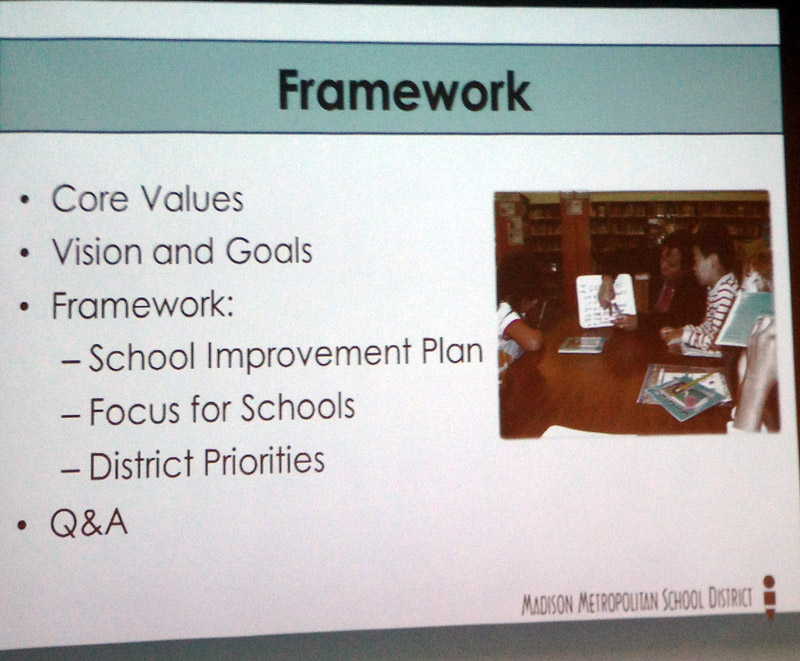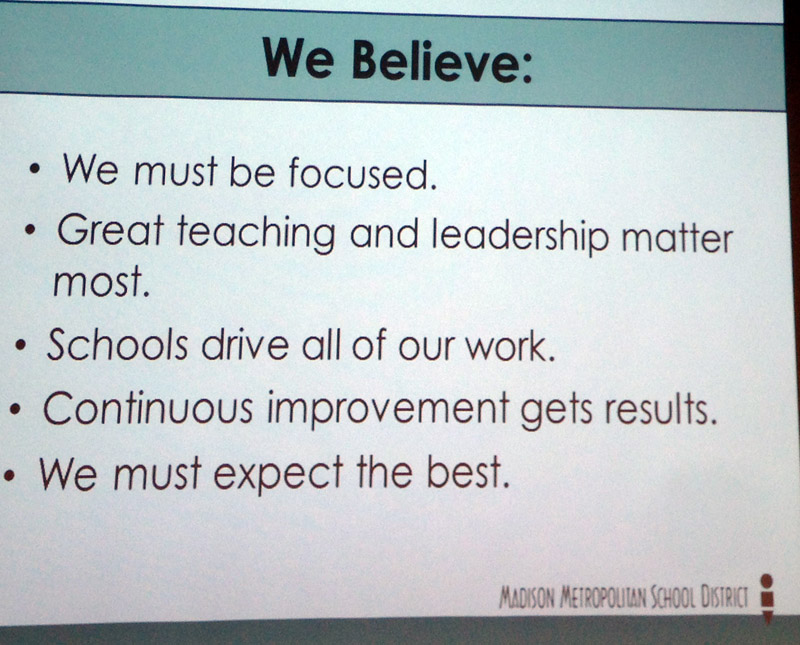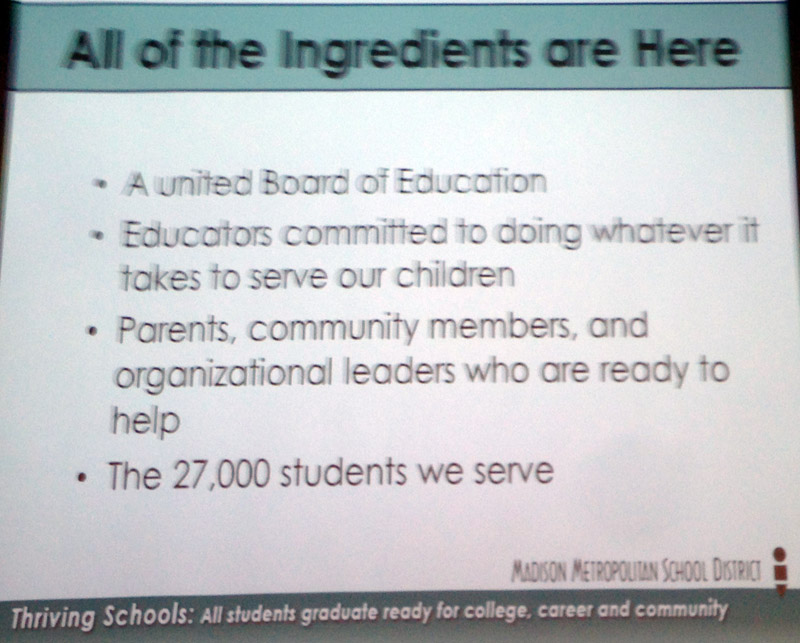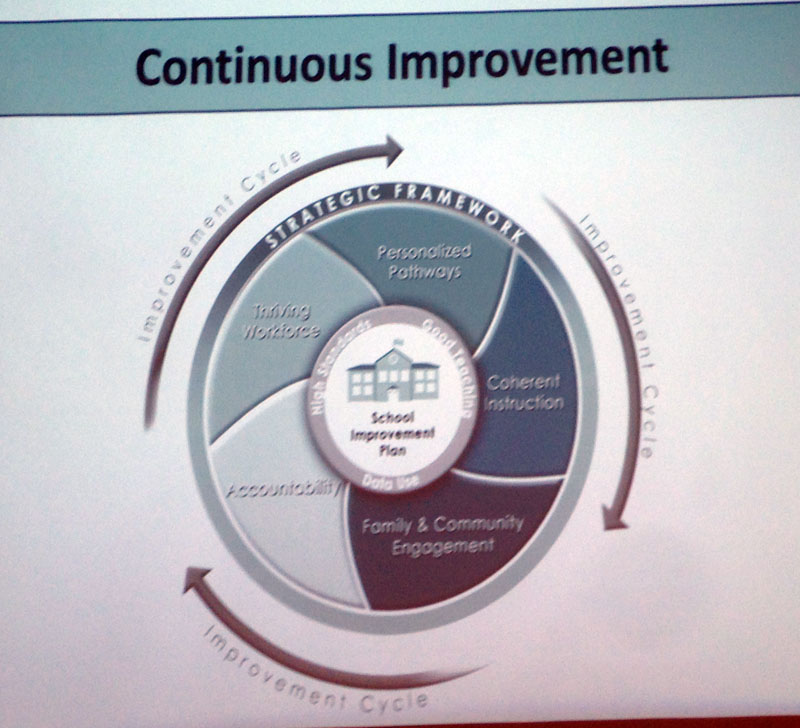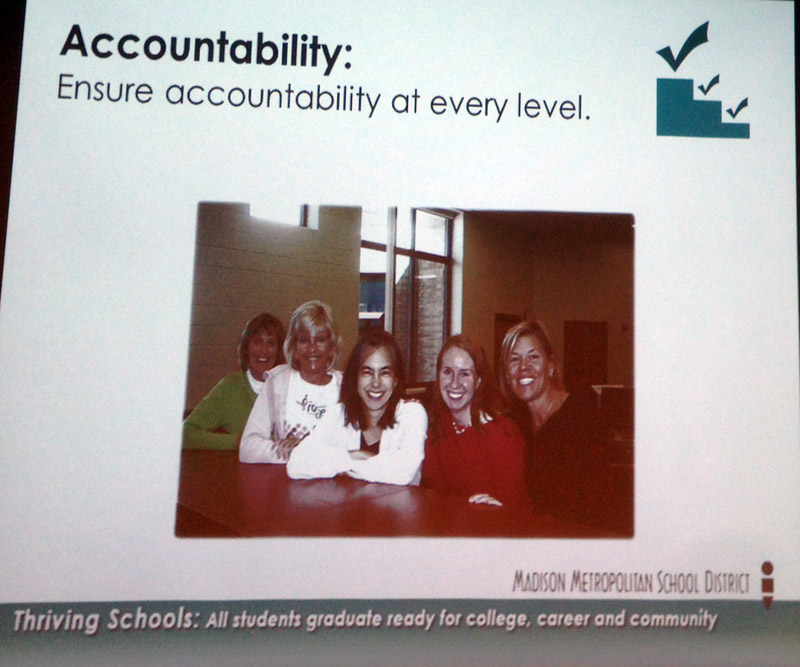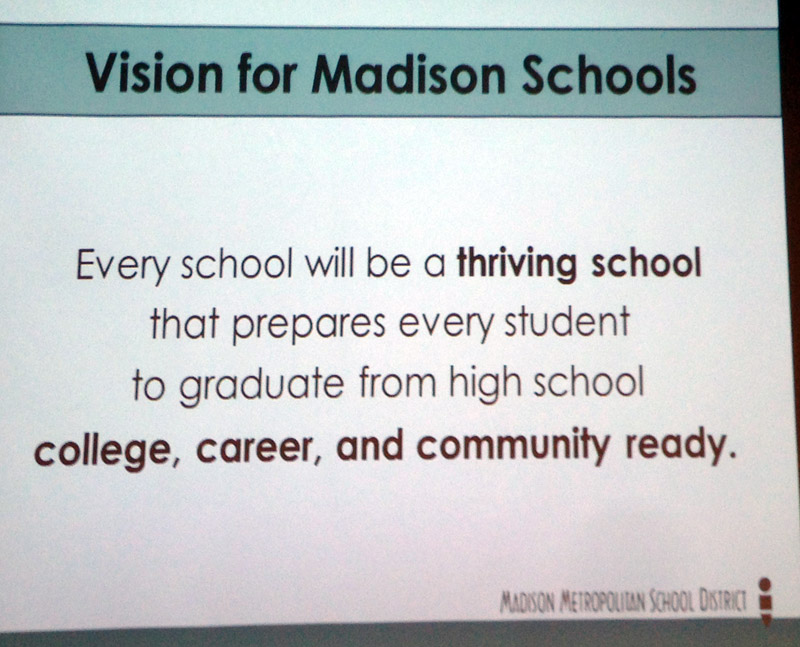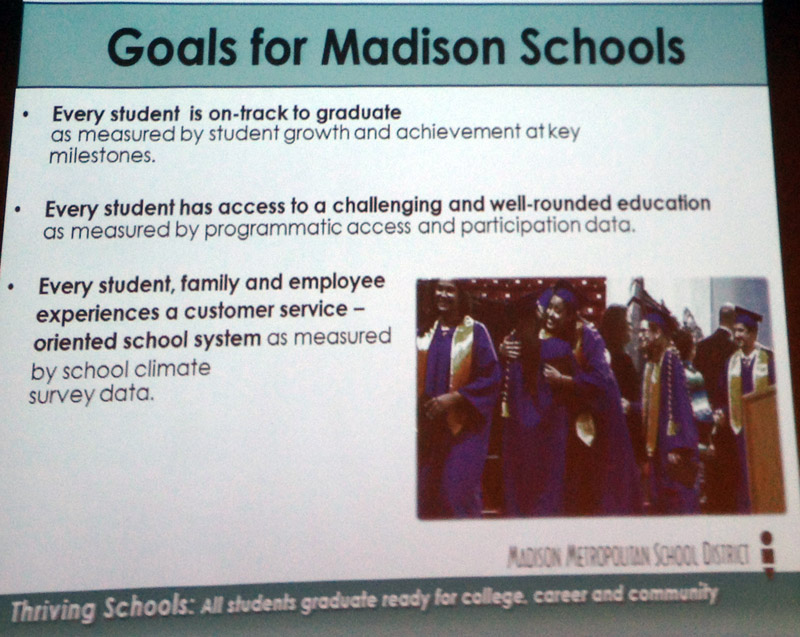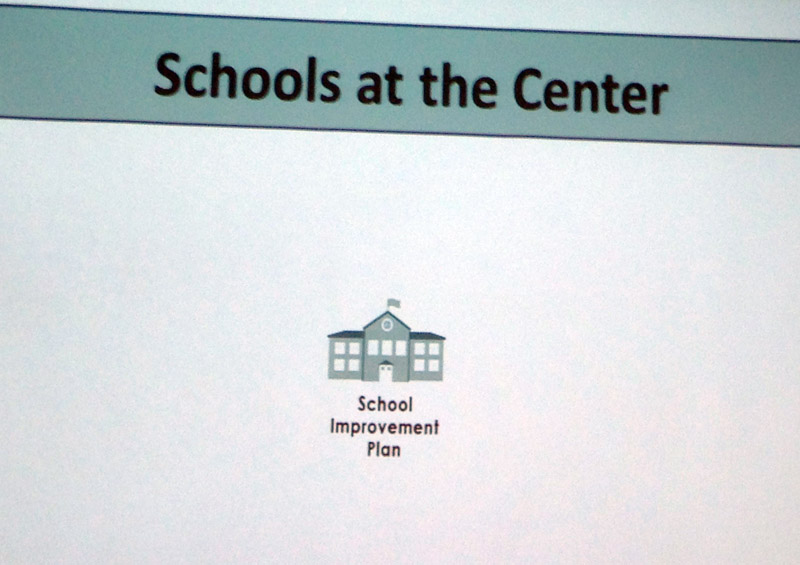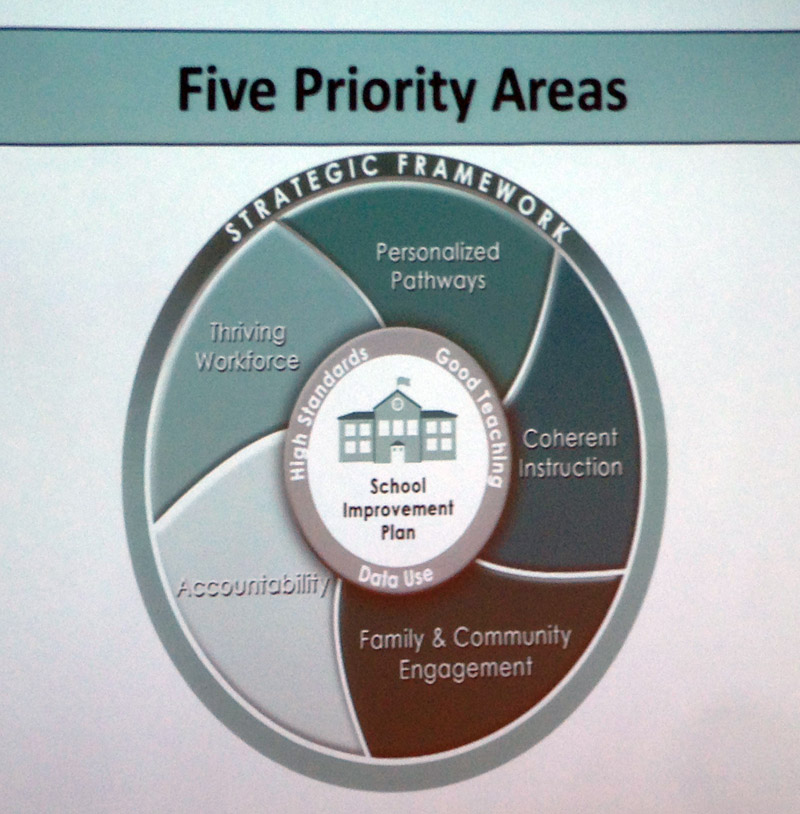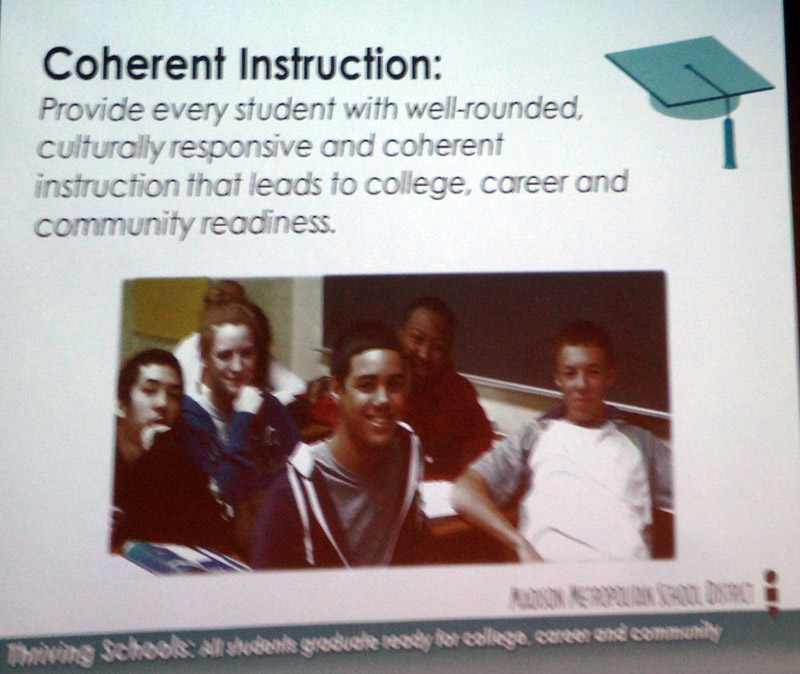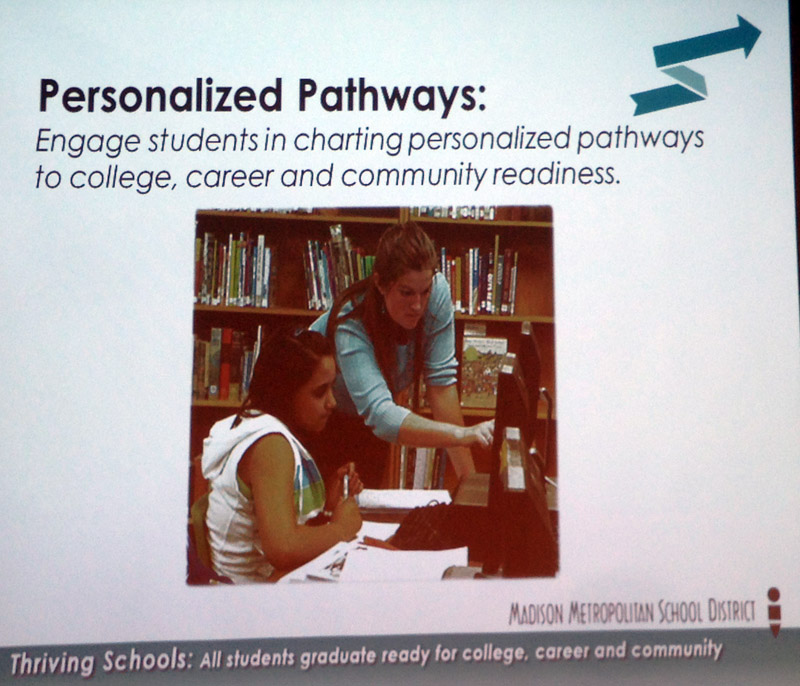Search Results for: Madison superintendent search
Restoring pandemic losses will require major changes in schools and classrooms, superintendents say
Paul Hill & Kate Destler: The solutions will require new modes of spending, performance measurement, and school oversight, as well as much greater flexibility in teacher hiring, training, and work. Superintendents and school-board leaders can’t make these changes all by themselves. They’ll need serious help and new thinking from governors, state legislators, the federal government, […]
Notes on Madison area K – 12 taxpayer supported school attendance
Scott Girard: MMSD spokesman Tim LeMonds told the Cap Times in an email Tuesday the district’s attendance rate Monday was 80.6%. That’s below the average of more than 90% throughout the 2020-21 school year, according to attendance data received through an open records request. Other area school districts, which all returned from winter break as […]
Milwaukee, Madison School Districts Refuse to Follow the Science
Brett Healy: Further proving that we have learned absolutely nothing from the last 22 months, both Milwaukee Public Schools (MPS) and the Madison Metropolitan School District (MMSD) announced plans to scrap students’ return to the classroom following Christmas break. Neither sounded particularly optimistic that this would be a temporary move. “While it is our goal […]
Parents vs taxpayer supported Madison K-12 school district administration
Elizabeth Beyer: It’s a complaint echoed by parents across the district Monday, on a day most expected to see their children back at school, as they were elsewhere in Dane County (but not in the state’s largest district, Milwaukee, which also went back to online learning temporarily). Several parents said they didn’t object to the […]
Commentary from the Wisconsin DPI Superintendent
Jonah Beleckis: They’re going to have to get away from the notion that we’re using this money to reward schools that were open for in-person instruction. Maybe we can use that $77 million for after-school programming, for tutoring, for learning loss. That’s what we need to do. Notes and links on Jill Underly. The data clearly […]
Wisconsin DPI Superintendent Rhetoric, amidst long term, disastrous reading results
Rory Linnane: Though the position is technically nonpartisan, Underly’s campaign was heavily funded by the Democratic Party in a race that saw unprecedented spending. Her campaign spent seven times that of her opponent, former Brown Deer Schools Superintendent Deborah Kerr. The only action Underly announced Thursday was the creation of a literacy task force to […]
Political Posturing, interests and “adult employment” on taxpayer supported Dane County Madison public health ordering schools closed
Wisconsin Supreme Court: For the respondent, there was a brief filed by Remzy D. Bitar, Sadie R. Zurfluh, and Municipal and Litigation Group ̧ Waukesha. There was an oral argument by Remzy D. Bitar. For the petitioners Wisconsin Council of Religious and Independent Schools, et al., there was a reply brief filed by Richard M. […]
Muldrow’s policies continue to drive (Madison) schools’ decline
Peter Anderson: The Capital Times editorializes, “Madison has a great public schools system” and Board President “Ali Muldrow, is a dynamic leader “who will move Madison schools in the right direction” — sentiments reminiscent of the acclaim it offered former Superintendent Jennifer Cheatham, whose policies Muldrow seems poised to continue. But is it really great? […]
An early look at the 2022 budgets of Wisconsin’s two largest school districts; +$70M for Madison!….
Wisconsin Policy Forum: Since 2013, the Wisconsin Policy Forum has produced an annual report on the superintendent’s proposed Milwaukee Public Schools (MPS) budget that analyzes and describes the key elements and provides an independent assessment for school board members as they deliberate its contents. Last year, for the first time, we produced a similar budget […]
Potential lawsuit over Madison West High Racial Segregation Policies
WILL: The Wisconsin Institute for Law & Liberty (WILL) issued a letter, Monday, to Madison Metropolitan School District (MMSD) Superintendent, Dr. Carlton Jenkins, urging the school district to address the racial segregation employed at Madison West High School for Zoom conversations on current events. This is the second occasion in the last year where WILL has warned […]
An Interview with Outgoing Madison School Board Member (and President) Gloria Reyes
David Dahmer: As president, Reyes has been the face and often the spokesperson of the Madison School Board during some very trying and challenging times including the COVID-19 pandemic and the canceling of in-person classes, the hiring of new MMSD superintendent twice (Dr. Matthew Gutierrez rescinded his acceptance of the job before MMSD started over […]
Madison Receives More Redistributed Federal Taxpayer Funds; $70,659,827 (!)
Molly Beck: The $797 million allocated for Milwaukee amounts to $11,242 per student — the second-highest distribution of COVID-19 relief funding. On the lowest end, the McFarland School District in suburban Madison will receive $107 per student, according to an analysis released by the nonpartisan Legislative Fiscal Bureau. Republicans who control the state’s budget-writing committee […]
Commentary on the 2021 Wisconsin Department of Public Instruction (DPI) Superintendent election
Scott Girard: [I have received 3 text messages and a door knock from a paid lit drop person, for one of the candidates. Guess?] 13-1 Special interest $pending for Wisconsin DPI Superintendent Candidate Jill Underly, running against Deborah Kerr. In that same forum, Kerr outlined a plan to decentralize the Department of Public Instruction by […]
Wisconsin Superintendent candidate Jill Underly accused of ‘hypocrisy’ for sending her children to private school
Daniel Bice: No one has been a bigger promoter of public schools during the race for state school superintendent than Jill Underly. That was, no doubt, a large part of the reason that Underly, the Pecatonica school superintendent, has won the endorsement of state and local teachers unions. But back when it was her decision to […]
Candidates for Wisconsin state school superintendent clash on leadership, vouchers
WISN: “I am pro-kid. I do not support taking away a parent’s right to choose where their kid goes to school,” Kerr said. “The state superintendent cannot change these laws. So look at the Legislature. Does anyone really think the current legislature is going to massively roll back these policies? No. But I’m going to […]
Madison’s Taxpayer Funded K-12 Governence Commentary; 2021 Edition
Scott Girard: Superintendent Carlton Jenkins shared the data from the family survey that went out Feb. 17 with the School Board this week. He said about 65% of families — or about 7,790 families — with a student in those grades, which will be among the first to return in a phased reopening process, had […]
Inside Education Column: Madison’s Literacy Task Force: Reading Renaissance or Recycling?
Armand A. Fusco, Ed.D. (Retired school superintendent, college administrator, columnist, author and consultant): Before looking at the Madison disastrous reading problem, some reading background will be helpful to put it into an historical perspective to fully understand the problems and issues involved that are also national in scope. What’s important to note is that it’s […]
Two Madison Parents: Why reopen MMSD schools now, and at what cost?
Sarah & Ben Jedd: On March 15, when the Madison Metropolitan School District shuttered buildings and sent students home, Dane County had eight cases of COVID-19. On Dec. 17, when MMSD superintendent Carlton Jenkins hosted a forum via Zoom to discuss reopening our schools, the county had over 3,000 positive cases this month alone. Nevertheless, […]
State superintendent agrees students are being “robbed” of their education; lawmakers can help by providing every student $3,000 in direct assistance
Liv Finne: As reported in The Seattle Times, State Superintendent Reykdal said Washington’s children are receiving a “sh-tty” education right now. This highest education official in Washington state is openly acknowledging that kids are feeling “robbed” of the education we have promised them. The legislature needs to step in and help families with direct educational assistance. […]
Commentary on Madison’s long term, disastrous reading results: “Madison’s status quo tends to be very entrenched.”
Scott Girard: “The problem was we could not get the teachers to commit to the coaching.” Since their small success, not much has changed in the district’s overall results for teaching young students how to read. Ladson-Billings called the ongoing struggles “frustrating,” citing an inability to distinguish between what’s important and what’s a priority in […]
Madison Schools Announce Plans to Embrace the Science of Reading
Joseph Da Costa: Madison school officials plan significant changes in reading and literacy instruction. District administrators presented the proposed changes to school board members at a recent Board of Education meeting and signaled a shift toward phonics and the science of reading. MMSD’s Chief of Elementary Schools, Carletta Stanford, acknowledged, “We know that what we’ve […]
Madison School Board President Gloria Reyes Will Not Seek Re-election
Gloria Reyes: FOR IMMEDIATE RELEASE December 1, 2020 Madison School Board President Gloria Reyes Will Not Seek Re-election Statement by Gloria Reyes I am announcing today that I will not seek re-election to the Madison School Board. This has been a difficult decision. I’ve made it after much consideration, consultation with my family, and as […]
Madison K-12 Tax, Referendum and Spending Climate: Operating referendum gains support over 2016, capital referendum down from 2015
Scott Girard: With wide margins of success on recent ballot measures, the Madison Metropolitan School District’s $350 million questions were almost certain to pass ahead of Tuesday’s ballot count. Four years ago, the district’s operating question won by a 74.2% to 25.8% margin, while a capital referendum the year prior passed with 82.2% of voters […]
Miami does more with less (about half of Madison’s per student spending)
Joanne Jacobs: Public-school enrollment grew by 16 percent from 1994 to 2017, the number of teachers by 28 percent and the number of all other staff grew 51 percent, according to Ben Scafidi of Kennesaw State. The “staffing surge” has inflated school budgets. But not in Miami-Dade, the fourth-largest district in the U.S., writes Michael Q. […]
Covid-19 and Madison’s K-12 World
Hi, I’m cap tines K-12 education reporter Scott Gerard. Today. Our cap times IDFs panel will discuss how will COVID-19 change K-12 education. I’m lucky to have three wonderful panelists with me to help answer that question. Marilee McKenzie is a teacher at Middleton’s Clark street community school, where she has worked since the school was in its planning stages.
She’s in her [00:03:00] 11th year of teaching. Dr. Gloria Ladson billings is a nationally recognized education expert who was a U w Madison faculty member for more than 26 years, including as a professor in the departments of curriculum and instruction, educational policy studies and educational leadership and policy analysis.
She is also the current president of the national Academy of education. Finally dr. Carlton Jenkins is the new superintendent of the Madison metropolitan school district. He started the districts top job in August, coming from the Robbinsdale school district in Minnesota, where he worked for the past five years, Jenkins began his career in the Madison area.
Having worked in Beloit and at Memorial high school in early 1990s before moving to various districts around the country. Thank you all so much for being here. Mary Lee, I’m going to start with you. You’ve been working with students directly throughout this pandemic. How has it gone? Both in the spring when changes were very sudden, and then this fall with a summer to reflect and [00:04:00] plan, it’s been interesting for sure.
Um, overall, I would say the it’s been hard. There has been nothing about this have been like, ah, It’s really, it makes my life easy. It’s been really challenging. And at the same time, the amount of growth and learning that we’ve been able to do as staff has been incredible. And I think about how teachers have moved from face-to-face to online to then planning for.
After a turbulent search process, MMSD’s first Black superintendent takes charge
Benjamin Farrell: On July 10, after another, much shorter search, MMSD settled on UW-Madison alumnus and former associate principal of Madison Memorial High School Dr. Carlton Jenkins to be the district’s first Black superintendent. Since his time at Madison Memorial, Jenkinshas held high-ranking positions in school districts in New Hope, Minnesota; Beloit, Wisconsin; and Atlanta, […]
Madison School District plans to apply for waivers from some state requirements
Scott Girard: The Madison Metropolitan School District plans to apply for a series of waivers from state requirements later this month for the 2020-21 school year. On the same day as students began the school year virtually, administrators told the School Board about three waivers they plan to request — as long as the board […]
(some) Madison School board COmmentary on Planned West High School Grading Changes
So in a district where this was previously implemented, um, failure went down, but so did rates of students earning A’s and B’s and our level classes, um, and teachers found that it had eroded some students’ motivations. So I was wondering if that’s a concern at all in how the district might address that. […]
A summary of community feedback (website) on Madison’s recent Superintendent candidates
Scott Girard: Records released by the Madison Metropolitan School District show feedback from staff and community members included plenty of praise and criticism for the two finalists for the district’s superintendent position this summer. Both Carlton Jenkins and Carol Kelley received positive feedback from many who filled out the forms, which asked respondents to answer […]
New Madison Superintendent Adds an elementary administrator
Logan Wroge: “I have to address that because if you look at the data on the elementary level, we need to focus on literacy, we need to focus on numeracy, we need to focus on our special ed, our (English-language learners),” Jenkins said in the interview. 2017: West High Reading Interventionist Teacher’s Remarks to the School […]
Hard Questions: An interview with Madison Superintendent Carlton Jenkins
via Simpson Street Free Press 2017: West High Reading Interventionist Teacher’s Remarks to the School Board on Madison’s Disastrous Reading Results Madison’s taxpayer supported K-12 school district, despite spending far more than most, has long tolerated disastrous reading results. My Question to Wisconsin Governor Tony Evers on Teacher Mulligans and our Disastrous Reading Results “An emphasis on adult employment” Wisconsin […]
New Madison School District
Scott Girard: In his first week, the former Memorial High School associate principal said he learned that there are “just a bunch of wonderful people” in Madison. “This energy that’s happening right now from people inside the district and outside the district, really wanting Madison to move forward,” Jenkins said. “There’s a momentum, and people […]
New taxpayer supported Madison K-12 superintendent to prioritize students’ mental, emotional health
Scott Girard: The new Madison Metropolitan School District superintendent stressed the importance of community buy-in during his introductory press conferenceWednesday. Carlton Jenkins, hired in early July, began in the role Aug. 4. He said he will focus on improving reading abilities, improving student mental health and rebuilding trust during his first year on the job, stressing the […]
Madison’s Taxpayer Supported K-12 Schools’ fall plan includes Sept. 8 virtual start, MSCR child care for up to 1,000 kids
Scott Girard: District administrators outlined the latest updates to the “Instructional Continuity Plan” Monday night for the School Board’s Instruction Work Group. Board members expressed appreciation to staff for their efforts and asked questions about engaging students and ensuring they get some social experiences despite the restrictions of the virtual environment. The district announced July 17 it […]
Madison Superintendent hire Carlton Jenkins tells Black leaders he’s ‘ready to go to work’
Logan Wroge: Former School Board member James Howard, who also served as president, said the district’s No. 1 challenge is the low reading outcomes for Black children, where only 9% of scored proficient on a state assessment. “Before our kids can succeed academically … we have to do something about our reading scores,” Howard said. […]
Madison’s taxpayer supported schools need to fix its transparency problem if it wants voters’ trust (achievement?)
Dave Zweifel: If the Madison School Board hopes to convince the district’s voters to approve two referendums totaling $350 million this fall, it might be wise for it and the school district it governs to stop playing games with our long tradition of open government. At the same meeting this week where the board authorized […]
Analysis: Madison school district’s lenient discipline policy is a dismal failure
Dave Daley: In 2013, the Madison school district had a zero-tolerance policy for misbehavior. Suspension was almost automatic for most violations. When Cheatham became superintendent that year, she was determined to bring down suspension and expulsion rates that she felt unfairly affected black students. Black students made up 62% of expulsions for the previous four […]
“We know best”: Madison School Board approves superintendent contract before it becomes public
Logan Wroge: The Madison School Board approved a contract Monday to hire a Minnesota school administrator as the next superintendent before releasing details of the agreement to the public. That’s a change from how the board handled the hiring process for its first choice for superintendent — who later backed out of the job — […]
Carlton Jenkins is named Madison’s next K-12 Superintendent
Scott Girard: Carlton Jenkins said moving to work in the Madison Metropolitan School District would be like “going home.” One of two finalists to become the district’s next superintendent, Jenkins was an associate principal at Memorial High School in 1993 and earned his doctorate at the University of Wisconsin-Madison. Throughout the day Tuesday, the Robbinsdale […]
Commentary on Two 2020 taxpayer supported Madison School District Superintendent Candidates
Scott Girard: Madison School Board president Gloria Reyes said in the release the district is “very fortunate to have an impressive pool of highly qualified candidates participate in this process.” “With a focus on how candidates aligned with the Leadership Profile, the Board was able to select two phenomenal finalists, both with deep roots in […]
Madison’s 37% Property Tax Growth (2012 – 2021). Outcomes?
Briana Reilly: Estimates flagged in the report show property taxes would be nearly 38% higher next year under the proposed operating budget compared with 2012, a jump the brief notes is “more than twice the rate of inflation” and doesn’t include potential changes in state aid levels going forward. Crafting Madison Metropolitan School District’s budget is […]
Madison K-12 Spending up 19% from 2014-2020
MMSD Budget Facts: from 2014-15 to 2020-21 [May, 2020] 1. 4K-12 enrollment: -1.6% (decrease) from 2014-15 to projected 2020-21 2. Total district staffing FTE: -2.9% (decrease) from 2014-15 to proposed 2020-21 3. Total expenditures (excluding construction fund): +17.0% (increase) from 2014-15 to proposed 2020-21 4. Total expenditures per pupil: +19.0% (increase) from 2014-15 to proposed […]
Madison School Board May Retreat
Madison School Board: Meeting Objectives ● Understand Applicable Legal Statutes that pertain to School Boards ● Develop a planned strategy to successfully transition to a new leadership paradigm with the MMSD school board, superintendent, administration/staff, parents/guardians, and community creating a dynamic school community team. Legal notice and zoom link. Notes and links on Madison’s 2020 Superintendent […]
Resisting Open Records Requests at the taxpayer supported Madison School District
Scott Girard: The Cap Times submitted an open records request the morning of Jan. 17, the deadline for residents to submit feedback through an online form, asking for “any and all public feedback on the Madison Metropolitan School District superintendent finalists, submitted online or via forms at the public forums, as of 8 a.m. Friday, […]
Christina Gomez Schmidt wins close Madison School Board contest; Nicki Vander Meulen reelected
Logan Wroge: As a member of the School Board, Gomez Schmidt, 48, is looking to prioritize the selection of a new, research-based reading curriculum for elementary students, building trust in the district with families, improving accountability and transparency, and effectively managing the budget. The 32-year-old Pearson had made finding ways to expand 4-year-old kindergarten to […]
Madison’s No-Bid $30,000 Contract to Burns/Van Fleet (?)
No bid contracting by our taxpayer supported Madison School District: a $30,000 no-bid contract to “Burns/Van Fleet” for 25 days of services to help in the new superintendent transition. (The superintendent search contract to BWP Associates was $32,000 plus expenses.) The Mike Hertting memo on the item touts this outfit as having “over 50 years […]
Open Records Response: “Community Leader & Stakeholder” meeting with Madison Superintendent Candidates
On January 21, 2020, I sent this email to board@madison.k12.wi.us Hi: I hope that you are well. I write to make an open records request for a list of invitees and participants in last week’s “community leader and stakeholder” meetings with the (Superintendent) candidates. Thank you and best wishes, Jim Hearing nothing, I wrote on […]
Black community leaders share concerns about Madison School District’s superintendent hire, call process ‘flawed, incomplete’
Scott Girard: A letter signed by 13 black community leaders in Madison expresses concerns about the Madison Metropolitan School District’s hiring of Matthew Gutiérrez to be its next superintendent. The concerns include how much larger and more diverse MMSD is than Gutiérrez’s current Seguin Independent School District in Texas, student performance scores in Seguin and a “flawed, […]
Nine Area School Buildings Earn Commendable Or Better Rating On 2019 ESSA Report Card (a missing topic around Madison)
Nathan Konz: Last week, the Iowa Department of Education released the 2019 school ratings with nine of our area school buildings earning a “commendable” or better score. Each public school receives a score out of 100 based on standards laid out in the Every Student Succeeds Act (ESSA). South Central Calhoun High School was the […]
Notes and links on the Madison School District’s academic and safety climate
David Blaska: Board of education president Gloria Reyes demands “the conversation around school discipline needs to be centered on race,” according to the WI State Journal. Those who counter that school discipline needs to be centered on behavior will be asked to leave the conversation. Maybe the answer is pick out some white kids and toss them […]
New Madison Schools superintendent’s $250K+ contract up for vote Monday
Scott Girard: The contract runs from June 1 to May 31 of the following year. The agreement would allow Gutiérrez 25 vacation days each year, 10 holidays off and up to 13 personal illness days. It will provide up to $8,500 for moving expenses as Gutiérrez and his family move from Seguin, Texas, and cover […]
Madison schools’ happy talk Cheat(ham)s black kids
David Blaska: A crusader has stuck his out out of the foxhole to take on the political correctness that is destroying Madison’s public schools. We introduced him to you Blaska Policy Werkers two weeks ago. He is Peter Anderson, an environmental activist. Peter has put up a website called “Durable Justice.” Bookmark it. (We’ll wait. Got it?) Anderson […]
Guilty white teacher defends Madison school chaos
David Blaska: This trenchant observation drew a response from one Stan Endiliver, who (contrary to his intention) betrays why virtue-signaling progressives like himself are piping at-risk kids to disaster by playing the victim fife. MMSD teacher here; relax 1. If you are a parent of a student in MMSD, you have nothing to fear.[Blaska: as […]
School Board chooses Matthew Gutiérrez as next Madison superintendent
Scott Girard: Gutiérrez said in the release he was “honored and humbled to be selected,” touting community engagement and support to teachers, students and families as “top priorities.” “During my visit to Madison, I was extremely impressed with the high level of community involvement and how community members hold education as a top priority,” he […]
Mission vs organization: leadership of the taxpayer supported ($500m+ annually) Madison School District
David Blaska: Only 8.9% of Madison’s African American high school students are proficient in English, according to 2019 ACT scores. One of every five African American students never graduate. In math, 65% of black students test below basic proficiency, according to the Wisconsin Department of Public Instruction. Not to worry, the district now prohibits teachers […]
Candidate Quotes from Madison’s 2020 Superintendent Pageant
Scott Girard: Behavior Education Plan Vanden Wyngaard: “Just like in previous districts I have been in, it appears we have a perception issue in the community.” Gutiérrez: “What I’ve seen is a rather comprehensive plan. I think it may be a little overwhelming for folks. How can we simplify that to be user-friendly, easy to […]
Madison 2020 Superintendent Pageant: Eric Thomas appearance notes
Logan Wroge: “We have a district that is successful for a group of kids. We have a different district that’s not being successful for a group of kids,” he said of the Madison School District. “That means our organization is uniquely and excellently designed to get the results that we’re presently getting. If we keep […]
“Madison teachers say ‘society is murdering black & brown people”
David Blaska: We are a group of educators planning a Black Lives Matter Week of Action in Madison as part of the National BLM Week of Action February 3-7, 2020. The Black Lives Matter movement recognizes the impact of mass incarceration, poverty, non-affordable housing, income disparity, homophobia, unfair immigration laws and policies, gender inequality, and poor access […]
No safe space for reformers at Madison’s Jefferson middle school? “One can create the greatest safe space on earth here in Madison but when they go out in the world you are killing these children, they won’t be able to function out in the world which lacks such safe spaces.”
David Blaska: “Teachers are very very afraid.” — former teacher* Parents are mobilizing for a showdown at Madison’s Jefferson middle school, which they describe as ruled by virtue-signaling administrators and out-of-control students. The flash point was on December 3 when a 13-year-old boy shot a girl with a BB gun outside from a bus window. The student […]
2020 Madison Superintendent Pageant: Eric Thomas stresses success for ‘all students’ in Madison School District is key
Scott Girard: “My background is very much anchored on supporting all students,” Thomas said. “That’s sort of why I wake up every morning. The notion that all students are able to achieve at a high level, I truly not only believe it, but I’ve seen it, I’ve experienced it. I know it’s possible.” He will […]
2020 Madison Superintendent Pageant: Marguerite Vanden Wyngaard
Logan Wroge: She also highlighted the importance of having teachers know the cognitive process of how children learn to read to improve literacy outcomes. When asked about school-based police officers, a divisive topic in the Madison School District, Vanden Wyngaard said she doesn’t have a problem with police being in schools but thinks they should […]
2020 Madison Superintendent Pageant: Gutiérrez hopes to be ‘uniter’ for Madison School District
Scott Girard: Are we able to be laser focused on a number of a initiatives?” Gutiérrez said. “When you really do the research, the most highly successful systems have just three or four initiatives that they’re focused on, and you can do them really well.” He also brings recent experience with one of the likely […]
2020 Madison Superintendent Pageant: Vanden Wyngaard wants to focus on social justice, equity in MMSD if selected
Scott Girard: She noted successes while she was in Albany, mentioning the graduation rate, increased attendance rate and lower disproportionality in its special education programming among them, and said maintaining the programs that helped lead to those was part of the resignation decision. “I work from a philosophy of students first, and I always will […]
Madison School District superintendent finalists visit this week
Scott Girard: The three finalists to be the next leader of the Madison Metropolitan School District will visit the city this week. Their “Day in the District” will begin at 8 a.m. with meetings with community and staff groups until 11, followed by lunch with students until noon. The afternoon will include school visits, meetings with the […]
Commentary on Rhetoric: Departing Madison Superintendent Jennifer Cheatham
David Blaska: The news media loves to imagine itself as the afflicter of the comfortable, David with his slingshot v. Goliath. “J’accuse!” in 96-point bodoni bold type. Edward R. Murrow starring down Tailgunner Joe. Bogart starting the presses in Deadline USA. Woodward and Bernstein. In Madison, too many news media “gatekeepers” just want to be […]
Mckenna Kohlenberg: Why transparency is needed in Madison’s superintendent hiring process, and how to do it
Mckenna Kohlenberg: My concern stems from recent Board actions that I find concerning enough to warrant this stern message. As local press has noted (here too), the Board’s recent activities suggest a troublesome pattern of skirting, if not outright violating, open meetings and public records laws. Wisconsin law requires school boards, like other local public […]
Camden students have shown significant improvements in math proficiency, a new independent study has found (Madison?)
Vincent DeBlasio: Released Monday, the study from the Stanford University Center for Research on Education Outcomes (CREDO) looked at student academic growth in the various K-12 schools on a year-by-year basis from 2014-15 to 2016-17. Schools superintendent Katrina McCombs said the study confirms that students benefitted from the district’s “collaborative and focused efforts over the […]
Madison School District taps Jane Belmore (again) to serve as interim superintendent
Negassi Tesfamichael: A familiar face will serve at the helm of the Madison Metropolitan School District for the upcoming school year. The Madison School Board on Friday named Jane Belmore, a retired MMSD teacher and administrator, to serve as the interim superintendent. Belmore will take over once current Superintendent Jen Cheatham steps down at the […]
Why are Madison’s Students Struggling to Read?
Jenny Peek: Mark Seidenberg, a UW-Madison professor and cognitive neuroscientist, has spent decades researching the way humans acquire language. He is blunt about Wisconsin’s schools’ ability to teach children to read: “If you want your kid to learn to read you can’t assume that the school’s going to take care of it. You have to […]
Commentary on Avid/Tops in the Madison Schools
Logan Wroge: The board also approved a three-year partnership renewal with the Boys & Girls Club of Dane County for the college preparation program AVID/TOPS. The program is meant to prepare students for post-secondary education, particularly low-income and minority students or students who would be the first in their family to go to college. AVID/TOPS […]
Madison’s Taxpayer Supported K-12 School Superintendent Cheatham’s 2019 Rotary Talk
2013: What will be different, this time? Incoming Superintendent Jennifer Cheatham’s Madison Rotary Talk. December, 2018: “The data clearly indicate that being able to read is not a requirement for graduation at (Madison) East, especially if you are black or Hispanic” 2005: When all third graders read at grade level or beyond by the end […]
Ravenna school board fires superintendent for low student achievement
Justine Lofton: The board’s decision to replace VanLoon came after its performance evaluation of him in December resulted in a score of 2.41 out of 4. A score of 2 means “minimally effective,” while a 3 is “effective.” “Knowing that I’ve had effective or highly effective ratings for the past nine years, yes I was […]
Commentary on A Diverse K-12 Governance Model – in Madison (outside the $20k/student legacy system)
Neil Heinen: There is so much to like about One City’s structure and operation, starting with founder, President and CEO Kaleem Caire. Caire’s bedrock passion for education has always been part of what hasn’t always been a straight-line career path. But all of the elements of his business, civic, nonprofit and activist education ventures have […]
Madison School District’s advanced learner program is still a work in progress
Amber Walker: Though the Madison Metropolitan School District revised its advanced learner program in recent years, some schools are still struggling to provide tailored classroom instruction for qualified students. The district defines advanced learners as students who demonstrate, or have the potential to demonstrate, high performance in one or more areas. MMSD contracted with the […]
Wisconsin K-12 Academic Standards And The Department Of Public Instruction Superintendent Campaign
Molly Beck: He said the revision is necessary because the current state report card system should be more “honest and transparent” about how well schools are educating students. The current system rates schools higher than student test scores indicate, he said. “Fundamentally, the ratings are very likely to go down because that represents how our […]
deja vu: Madison, 2015
2005: When all third graders read at grade level or beyond by the end of the year, the achievement gap will be closed…and not before On November 7, Superintendent Art Rainwater made his annual report to the Board of Education on progress toward meeting the district’s student achievement goal in reading. As he did last […]
Commentary on Madison’s long term Reading “Tax” & Monolithic K-12 System
Possible de-regulation of Wisconsin charter school authorizations has lead to a bit of rhetoric on the state of Madison’s schools, their ability to compete and whether the District’s long term, disastrous reading results are being addressed. We begin with Chris Rickert: Madison school officials not eager to cede control of ‘progress’: Still, Department of Public […]
Madison’s Lengthy K-12 Challenges Become Election Grist; Spends 22% more per student than Milwaukee
Madison 2005 (reflecting 1998): When all third graders read at grade level or beyond by the end of the year, the achievement gap will be closed…and not before On November 7, Superintendent Art Rainwater made his annual report to the Board of Education on progress toward meeting the district’s student achievement goal in reading. As […]
1 in 3 Black Students Chronically Absent from Madison Schools
Molly Beck, via a kind reader: One in three black students was chronically absent from school during the 2013-14 school year, according to a Madison School District report. Thirty-six percent of the district’s black students have an attendance rate lower than 90 percent. That corresponds to missing, on average, one half day of school every […]
Commentary on Madison’s special Education and “inclusive” practices; District enrollment remains flat while the suburbs continue to grow
Pat Schneider: That was one issue that brought together family activists who formed Madison Partners for Inclusive Education [duckduckgo search] in 2003, Pugh said. “A parent in an elementary school on the west side could be seeing high-quality inclusive expert teaching with a team that ‘got it,’ and someone on the east side could be […]
A Positive Madison Magazine Article on Superintendent Jennifer Cheatham
Deanna Wright: Last April, and to a remarkable amount of fanfare, Jennifer Cheatham became the superintendent of the Madison Metropolitan School District. From the very start, the community has opened its arms to welcome her. When I interviewed her for Madison Magazine TV last month, I was aware that the community, especially parents of color, […]
Madison’s education academics get involved in the argument over education reform; What is the Track Record of ties between the Ed School and the MMSD?
“I’m an academic,” says Slekar, a Pittsburgh-area native whose mother and grandmother were elementary school teachers and who was a classroom teacher himself before earning a Ph.D. in curriculum from University of Maryland.
“I understand scholarship, I understand evidence, I understand the role of higher education in society,” he says. “When initiatives come through, if we have solid evidence that something is not a good idea, it’s really my job to come out and say that.”
Michael Apple, an internationally recognized education theorist and professor at University of Wisconsin-Madison agrees. In the face of conservative state legislators’ push to privatize public education, “it is part of my civic responsibility to say what is happening,” says Apple.
“In a society that sees corporations as having all the rights of people, by and large education is a private good, not a public good,” he says. “I need to defend the very idea of public schools.”
Both Apple and Julie Underwood, dean of the School of Education at UW-Madison, share Slekar’s concern over the systematic privatization of education and recognize a role for scholars in the public debate about it.
…
A wide-ranging, animated, sometimes loud conversation with Slekar includes familiar controversies hotly debated around the country and in the Wisconsin Capitol, like high-stakes testing, vouchers and Common Core standards. The evidence, Slekar says flatly, shows that none of it will work to improve student learning.
The reform initiatives are instead part of a corporate takeover of public education masquerading as reform that will harm low-income and minority students before spreading to the suburbs, says Slekar, in what he calls the civil rights issue of our time.
A 30-year attack has worked to erode the legitimacy of the public education system. And teachers are taking much of the blame for the stark findings of the data now pulled from classrooms, he says.
“We’re absolutely horrible at educating poor minority kids,” says Slekar. “We absolutely know that.”
But neither the so-called reformers, nor many more casual observers, want to talk about the real reason for the disparities in achievement, Slekar says, which is poverty.
“That’s not an excuse, it’s a diagnosis,” he says, quoting John Kuhn, a firebrand Texas superintendent and activist who, at a 2011 rally, suggested that instead of performance-based salaries for teachers, the nation institute merit pay for members of Congress.Local Education school academics have long had interactions with the Madison School District. Former Superintendent Art Rainwater works in the UW-Madison School of Education.
Further, this 122 page pdf (3.9mb) includes contracts (not sure if it is complete) between the UW-Madison School of Education and the Madison School District between 2004 and 2008. Has this relationship improved achievement?
Related: Deja Vu? Education Experts to Review the Madison School District and When A Stands for Average: Students at the UW-Madison School of Education Receive Sky-High Grades. How Smart is That?
Con & Pro Commentary on the Madison School District’s Proposed Technology Plan
Madison School District Superintendent Jennifer Cheatham is a strong supporter of technology in the classroom. That’s why she is putting a $27.7 million computer plan in front of the School Board tonight.
But Cheatham also knows what really drives education, from kindergarten to high school.
“It’s the quality of teachers that matters the most,” she told the State Journal editorial board during a recent meeting.
Putting a tablet computer into the hands of every Madison student “will absolutely help teachers with instruction,” Cheatham said.
In our multi-device, always-wired world, understanding and using the latest technology is a must for today’s students and can cater to their individual needs and interests.
Ultimately, the issue is not how many devices are in a classroom but, rather, how those devices are used. The technology needs to offer more than whiz-bang special effects. It needs to open new paths to learning.
The high-dollar technology plan has attracted critics who question the cost and worry about additional “screen time,” especially for the youngest students.The Madison Metropolitan School District’s multi-million dollar Tech Plan is spending a lot of money on devices not proven to benefit student learning, according to an assistant professor of education at Madison’s Edgewood College.
In addition, the district isn’t giving teachers, parents or students opportunities to provide meaningful feedback on the plan, said Donna Vukelich-Selva in written remarks to the Madison school board shared Monday with The Cap Times.
The School Board is scheduled to vote Monday, Jan. 27, on what is now a revised, estimated $27.7 million, five-year plan that would greatly increase the use of computers in classroom instruction. The school district pared the proposal slightly, following a community update session last week, to include fewer devices for the youngest students. The plan now would provide one computer tablet in the classroom for about every two kindergartners and 1st-graders, and a one-to-one computer ratio for students in grades 2-12.
But Vukelich-Selva said concerns that the district is moving too fast on the Tech Plan, expressed by parents and teachers at the community update Jan. 22 at Memorial High School, were dismissed.
“It is clear that many significant stakeholders in the district were not taken into account,” she wrote.
The Madison school board first considered a draft of the plan on Jan. 13.
On hearing criticism that the proposal has advanced too quickly, Madison Superintendent Jennifer Cheatham said last week that the district has been “thorough and methodical in the development of the draft plan.”
Vukelich-Selva also said there was inadequate assessment of the impact of one-to-one computing on learning for younger students through fifth grade. She pointed to an apparent focus on technology itself rather than curricular goals.
“The huge numbers of ‘devices’ we are being told we need in our classrooms will help support a vastly expanded platform for more standardized testing,” she said.
Research shows that most large-scale evaluations of one-to-one computing initiatives have found mixed or no results, and underscore the importance of teacher mastery of using the devices, Vukelich-Selva wrote, referring specifically to an article in “Educational Leadership” from February, 2011, that is critical of one-to-one programs.Much more on the Madison School District’s Technology Plan, here.
One would hope that prior multi-million dollar technology implementations such as Infinite Campus, would be fully implemented first.
A somewhat connected (one end of the class spectrum) view of the State of Madison’s $395M Public School District
Today, Caire’s tone has moderated. Somewhat.
“Teachers are not to blame for the problems kids bring into the classroom,” he says. “But teachers have to teach the kids in front of them. And Madison teachers are not prepared to do that. Now we have two choices: Make excuses why these kids can’t make it and just know that they won’t. Or move beyond and see a brighter future for kids.”
Many parents back him up. And many parents of students of color say that their experience with Madison’s public schools–both as students here, themselves, and now as parents–is simply much different and much worse than what they see white students and parents experiencing.
“I just always felt like I was on as a parent, like every time I walked through the door of that school I would have to go to bat for my son,” says Sabrina Madison, mother of a West High graduate who is now a freshman at UW-Milwaukee. “Do you know how many times I was asked if I wanted to apply for this [assistance] program or that program? I would always say, ‘No, we’re good.’ And at the same time, there is not the same ACT prep or things like that for my child. I was never asked ‘Is your son prepared for college?’ I never had that conversation with his guidance counselor.”
Hedi Rudd, whose two daughters graduated from East and son from West, says it has been her experience that the schools are informally segregated by assistance programs and that students of color are more likely to be treated with disrespect by school personnel. “Walk into the cafeteria and you’ll see the kids [of color] getting free food and the white students eating in the hall. I walked into the school office one day,” she recalls. “I look young and the secretary thought I was a student. She yelled, ‘What are you doing here?’ I just looked at her and said, ‘Do you talk to your students like that?'”
Dawn Crim, the mother of a daughter in elementary school and a son in middle school, says lowered expectations for students of color regardless of family income is an ongoing problem. “When we moved to Madison in 1996, we heard that MMSD was a great school district … and for the most part it has been good for our kids and family: strong teachers, good administrators, a supportive learning environment, and we’ve been able to be very involved.”
But?
“Regarding lower expectations for kids of color, not just disadvantaged kids, we, too, have experienced the lower expectations for our kids; overall there is a feeling and a sense of lower expectations,” Crim says. “And that should not come into play. All of our kids should be respected, pushed, have high expectations and should get the best education this district says it gives.”
In the meantime, the school district has been running programs in partnership with the Urban League of Greater Madison, UW-Madison, United Way of Dane County, the Boys and Girls Club of Dane County, and other organizations–all designed to lift scholastic achievement, close the gap, and get more kids graduated and on to college.
The Advancement Via Individual Determination program known as AVID (or AVID/TOPS, when coordinated with the Teens Of Promise program) is run by the district and the Boys and Girls Club here, and is a standout in a slew of public/private efforts to change the fate of students of color in Madison.
…..
At the end of the last school year, a total of four hundred forty-two students did not graduate on time from high school in Madison. One hundred nine were white, eighty-six were Hispanic, thirty-three were Asian and one hundred ninety-one were African American. If the graduation rate for African American students had been comparable to the eighty-eight percent graduation rate of white students, one hundred forty more African American students would have graduated from Madison high schools.
But they did not. While it’s true that the district actively searches out students who did not graduate on time, and works with them so that as many as possible do ultimately graduate, the black-and-white dividing line of fifty-five/eighty-eight remains for now the achievement gap’s stark, frightening, final face. What can be said is that many more Madisonians are paying attention to it, and many people in a position to make a difference are doing their level best to do something about it.
……
“One of the reasons we haven’t been as successful as we could be is because we’ve lacked focus and jumped from initiative to initiative,” she (Cheatham) says of the Madison schools.Related: notes and links on Mary Erpanbach, Jennifer Cheatham and Madison’s long term disastrous reading scores.
Background articles:
Notes and links on the rejected Madison Preparatory IB Charter School.
When all third graders read at grade level or beyond by the end of the year, the achievement gap will be closed…and not before (2005).
Notes and Links on the Madison K-12 Climate and Superintendent Hires Since 1992.
My Life and Times With the Madison Public Schools
Latest Madison Schools’ 2013-2014 $391,834,829 Budget.
Teacher teams, instructional materials bring Common Core to Madison students
Fourth grade teacher Carissa Franz starts her lessons by outlining the Common Core standards she and her students will focus on. Franz is in her second year at Ray W. Huegel Elementary School, and uses the standards to drive her teaching this year.
She and teachers throughout Madison are integrating the new Common Core State Standards, adopted by State Superintendent Tony Evers in 2010, into their curriculums with the help of new Common Core-aligned materials and district-supported teacher teams
The changeover to Common Core is a deliberate process. Franz meets monthly with the superintendent as part of a teacher advisory board that shares the “voice of the teachers” with the district, she said.
Every week, she meets with a group of teachers representing each grade level in her school to discuss how to align the standards and the math materials used district-wide with the needs of Huegel’s classrooms.
A few “Tweets” on Madison Superintendent Jennifer Cheatham’s Meeting with the Wisconsin State Journal
@jimzellmer She sees "lack of focus" as problem. District "has spread itself too thin." Throws so many strategies at problem. @MollyBeckWSJ
— Scott Milfred (@ScottMilfred) January 16, 2014
@jimzellmer On teaching and learning, district will now "execute on a few things & do them really well." @MollyBeckWSJ
— Scott Milfred (@ScottMilfred) January 16, 2014
I’m glad to see the apparent focus on doing a few things well. This is the only way forward given the District’s disastrous reading results. That said, I was disappointed when the new Superintendent largely continued the “same service” budget approach during the 2013-2014 financial discussions.
The District’s 2x per student spending (above the national average) has supported numerous initiatives, likely preventing a focus on those that are truly meaningful for our students. For example, Kerry Motoviloff noted that Madison Schools Administration has “introduced more than 18 programs and initiatives for elementary teachers since 2009”. Steven Sinofsky’s latest is also worth reading in this context.
Madison Superintendent Jennifer Cheatham proposes $31 million, five-year technology plan
All students in the Madison School District would have their own tablets or notebook computers by the 2018-19 school year under a five-year, $31 million plan proposed by Superintendent Jennifer Cheatham.
If approved, the plan would increase the district’s current
$1.5 million annual technology budget to $4.2 million in the 2014-15 school year to start upgrading the district’s network infrastructure, upgrade or equip classrooms and libraries with new technology or computers, and provide notebook computers to all district teachers and administrators. Elementary teachers also would get tablet computers under the plan.
Costs to upgrade are projected to increase each of the five years of the plan for a total of $31 million spent in that time. Afterward, the annual budget for technology would be about $7 million per year going forward.
…..
Madison School Board members, who formally received the plan at their meeting Monday, were mostly optimistic about the plan. Board member T.J. Mertz questioned whether the program needed to be as extensive as it’s proposed given what he said were other unmet needs in the district and given research that he called “universally disappointing” surrounding such initiatives.
Mertz said in an interview after Monday’s board meeting that he agrees with the majority of the investments in technology under the plan, “but then there’s a third or a quarter where I think it’s going overboard.”
As an example, Mertz said he questions whether every kindergarten student needs their own tablet computer.Prior to spending any additional taxpayer funds on new initiatives, I suggest that the District consider (and address) the status of past expensive initiatives, including:
Infinite Campus: is it fully implemented? If not, why? Why continue to spend money on it?
“Standards based report cards“.
Connected Math.
Small Learning Communities.
And of course, job number one, the District’s long term disastrous reading scores.
Madison already spends double the national average per student ($15k). Thinning out initiatives and refocusing current spending on reading would seem to be far more pressing than more hardware.
Madison School Climate, Achievement, Rhetoric & The New Superintendent
In light of Alan Borsuk’s positive article, I thought it timely understand the mountain to be climbed by our traditional $15k/student public school district. The charts above are a brief update of the always useful “Where have all the Students Gone” articles.
Further, early tenure cheerleading is not a new subject. Those interested might dive into the Capital Times & Wisconsin State Journal Superintendent (recently easily searched, now rather difficult) archive:
Cheryl Wilhoyte (1,569) SIS
Art Rainwater (2,124) SIS
Dan Nerad (275) SIS
That being said, Superintendent Cheatham’s comments are worth following:Cheatham’s ideas for change don’t involve redoing structure. “I’d rather stick with an imperfect structure,” she said, and stay focused on the heart of her vision: building up the quality and effectiveness of teaching.
Improving teaching is the approach that will have the biggest impact on the gaps, she said.
“The heart of the endeavor is good teaching for all kids,” Cheatham said in an interview. Madison, she said, has not defined what good teaching is and it needs to focus on that. It’s not just compliance with directives, she said.Perhaps the State Journal’s new K-12 reporter might dive into what is actually happening in the schools.
Related: Madison’s long term disastrous reading results and “When all third graders read at grade level or beyond by the end of the year, the achievement gap will be closed…and not before“.
Minneapolis Property Taxes are over 50% less than Madison’s on a Similar Home; Mayoral Election Education Commentary
A cynic would be forgiven for wondering whether the press conference Minneapolis mayoral candidate Mark Andrew held Monday afternoon, flanked by five members of the school board, was at least partly an exercise in damage control.
At the session, held in the library at Windom Dual Immersion School in southwest Minneapolis, Andrew announced a three-pronged education agenda. At its center: a promise to convene a collaborative headed by education advocates with divergent philosophies, Mike Ciresi and Louise Sundin.
“The conversation about improving educational outcomes for kids of color has gotten extremely polarized and increasingly heated in the past several years,” Andrew explained in the plan. “The reformers vs. unions dichotomy is unproductive, and doesn’t serve the best interests of our children or find Minneapolis solutions to the problems in Minneapolis’ schools.”Minneapolis plans to spend $524,944,868 (PDF budget book) during the 2013-2014 school year for 34,148 students or 15,364 per student, about the same as Madison.
Yet, property taxes are substantially lower in Minneapolis where a home currently on the market for $279,900 has a 2013 property tax bill of $3,433. A $230,000 Madison home pays $5,408.38 while a comparable Middleton home pays $4,648.18 in property taxes. Madison plans to increase property taxes 4.5% this year, after a 9% increase two years ago, despite a substantial increase in redistributed state tax dollar receipts. Yet, such history is often ignored during local tax & spending discussions. Madison Superintendent Cheatham offers a single data point response to local tax & spending policy, failing to mention the substantial increase in state tax receipts the year before:When we started our budget process, we received the largest possible cut in state aid, over $8 million,” Cheatham said. “I’m pleased that this funding will make up a portion of that cut and help us accomplish what has been one of our goals all along: to reduce the impact of a large cut in state aid on our taxpayers.”
A bit more background.
Jennifer Cheatham takes charge of Madison schools
Jennifer Cheatham doesn’t have the countenance of someone who has stepped into a maelstrom. Madison schools superintendent since April, Cheatham, 41, has already visited every school in the district and rolled out a “Strategic Framework” to tackle some of the district’s thorniest issues, including the achievement gap. So far she’s generated considerable excitement around her plans and raised hopes, even among skeptics.
Kaleem Caire has even put off plans to file a federal civil rights complaint against the district for the school board’s rejection of a charter school geared toward low-income minority students. The CEO of the Urban League of Greater Madison, which spearheaded the proposal, says he’s now content to play a “facilitative, supportive role” and get behind Cheatham’s plan to “bring order and structure” to the district.
“Personally, I’ve been hanging back, letting her get her space,” says Caire. “The superintendent should be the leader of education. All of us should be supporting and holding that person accountable.
Comparing Madison, Boston & Long Beach Public Schools: Student/Teacher Ratio
Madison Superintendent Jennifer Cheatham recently cited the Boston and Long Beach Schools for “narrowing their achievement gap” during a July, 2013 “What Will be Different This Time” presentation to the Madison Rotary Club.
As time permits, I intend to post comparisons between the Districts, starting today.
Student / Teacher Ratio
Per Student Annual Spending
Boston Schools’ budget information was, by far the easiest to find. Total spending is mentioned prominently, rather than buried in a mountain of numbers.
Finally, after I noticed that Madison’s student / teacher ratio is significantly lower than Boston, Long Beach and the Badger state average, I took a look at the Wisconsin DPI website to see how staffing has changed over the past few years. Madison’s licensed staff grew from 2,273 in 2007-2008 to 2,492 in 2011-2012.
What are the student achievement benefits of Madison’s very low ratio?
Related: Madison Schools’ 2013-2014 budget includes a 4.5% property tax increase after 9% two years ago.
“Plenty of resources” and “the Madison School District has the resources to close the achievement gap“.
Madison School District & Madison Teachers to Commence Bargaining
Given MTI’s victory in Circuit Court, wherein Judge Juan Colas found Act 10 unconstitutional, MTI and the District have agreed to commence Contract negotiations (PDF).
Details of this were announced in a joint letter to all District employees last Friday from Superintendent Jen Cheatham and MTI Executive Director John Matthews. Their letter stated that, “… to be successful this year and in the years to come, District employees must have a work environment that is both challenging and rewarding, and one which includes economic and employment security”. Matthews complimented the Superintendent and Board members for their progressive philosophy in recognizing the essentials in positive employment relations.
Contracts existed in all 423 school districts at the time Act 10 was passed in 2011. Currently, workers in only four school districts enjoy the wages, benefits and rights which a Collective Bargaining Agreement provides. The current Contracts for MTI’s five bargaining units expire June 30, 2014.
The State has appealed Judge Colas’ decision. The matter will be heard by the Wisconsin Supreme Court in November or December. In his ruling, Judge Colas stated that Act 10 was passed in a very controversial manner, skipping several steps mandated by legislative rules and Wisconsin law, and that it violated public workers’ Constitutional guarantees of freedom of speech and freedom of assembly, as well as the Constitutional guaranteed Equal Protection Clause.I wonder what the sentiment across the teacher population might be? Perhaps there have been surveys?
Madison K-12 Tax & Spending Climate: City Budget Slows Spending Growth, K-12 School District Raises Taxes. 4.5%
Madison leaders say trimming city workers’ pay might be necessary:
Scheduled pay raises for union-represented city employees may need to be trimmed to help balance the 2014 city budget, Madison Mayor Paul Soglin and City Council President Chris Schmidt said Friday.
Schmidt said he didn’t relish the step — calling city workers “already underpaid for the jobs they do” — but he argued there could be no other choice.
Revenue limits under state law, rising city costs for fuel and health insurance, and a steadfast goal to protect funding for basic city services increasingly tie the city’s hands, he said.
“It’s understandable why it’s on the table, why we’re discussing it,” he said about the possible action, in which a 3 percent raise scheduled to start in the last pay period in December could be scaled back or eliminated for many employees in March.Contract talks for Madison School District employees set to start this month, letter says contract negotiations for Madison School District employees are set to begin later this month, according to a letter sent Friday to district staff by superintendent Jennifer Cheatham and Madison Teachers Inc. executive director John Matthews.
Cheatham said in a phone interview that she and employee unions will be negotiating “as soon as we can” in order to create collective bargaining agreements that will take effect after the current contracts end in June 2014.
MTI asked the district to begin collective bargaining in May, but the new superintendent wanted to adjust to her role, become acquainted with the staff and hear their requests before bargaining with the teachers union and other employee unions.
Although the timeline is unclear, Cheatham said she expects to complete the contracts “fairly quickly” while also taking time to ensure the process is done correctly and has an outcome acceptable to all parties.Much more on the Madison School District’s 2013-2014 budget (including a 4.5 property tax increase, after 9% two years ago), here.
Madison School District students should expect visible changes this year
When Madison public school students go back to class Tuesday, they’ll find some lessons will be tougher, according to Superintendent Jennifer Cheatham.
The gradual implementation of the Common Core standards, a series of benchmarks for what students should know and be able to do, will begin this year by helping educators, students and staff understand what the standards are and how instruction will change .
Teachers will implement Close Reading, a practice used to study literacy standards , to become more familiar with the increase in rigor and standards while monitoring how the students and the teachers themselves are faring .
“The study will allow teachers to better understand the standards and learn about what it will take to plan instruction using the standards and learn more about instructional practices necessary to teach the standards and learn about” ways to assess what students are learning, Cheatham said.
An example of a Close Reading lesson would be reading a primary source document in a history class and later answering short-answer questions. Teachers would review how students performed, what challenges there were and what the teacher could do to improve.
A Public Hearing on the Madison Schools’ Proposed 4.5% Property Tax Increase Monday, No Mention of Last Year’s Significant State Tax Dollar Funding Increase
More charts on Madison schools’ spending & property tax growth over the years, here.
Karen Rivedal:The Madison School Board will hold a one-hour public hearing at 5 p.m. Monday on a preliminary $391 million budget proposal for the 2013-2014 school year, in the McDaniels Auditorium of the Doyle Administration Building at 545 W. Dayton St.
After the hearing, the board is to vote on the budget, which includes a $260.4 million property tax levy, increasing the tax bill on an average $230,831 Madison home by about $102. The board will take a final vote on the tax levy in October, after official state aid figures are known.Related: Madison Schools’ 2013-2014 Budget Charts, Documents, Links, Background & Missing Numbers.
Finally, Rivedal’s article fails to mention this: Up, Down & Transparency: Madison Schools Received $11.8M more in State Tax Dollars last year, Local District Forecasts a Possible Reduction of $8.7M this Year. Local household income changes are unmentioned, as well (national data).
Much more on the 2013-2014 Madison schools’ budget, here.
A Middleton home paid $4,648.16 in 2012 while a Madison home paid 16% more, or $5,408.38. Local efforts to significantly increase property taxes may grow the gap with Middleton..
Rivedal’s article is unfortunately a classic “low information” piece. It would not take much effort to challenge the new Superintendent’s rhetoric on “state funding decline”. The prior year’s significant increase goes unmentioned.
Is it the State Journal’s policy to simply publish rhetoric without investigation?
Commentary on New Madison Superintendent Cheatham’s “Style”….
he gist of her framework is hard to argue. It calls for a renewed focus on learning, a school system that makes curriculum consistent across the district and better measures student and teacher performance. In sum, it is a back-to-basics approach that does not require new money, at least for now.
Madison, of course, has been grappling with its changing demographics where many students, especially minority children, struggle academically. In shorthand, it’s called the “achievement gap,” and the approach to date has been a long list of seemingly laudable, logical programs.
Now comes Cheatham saying we don’t need more money, at least not yet, but instead we need to rebuild the foundation. Might some see that as counterintuitive, I wonder?
“It might be,” she responds. “My take is that we were adding on with a big price tag to an infrastructure that was weak. … Does that make sense? The bones of the organization were weak and we didn’t do the hard work of making sure that the day-to-day processes … were strong before deciding to make targeted investments on top of a strong foundation.”
She continues: “That doesn’t mean that there won’t be some targeted investments down the line. I suspect that will be in things like technology, for instance, which is a real challenge … and is going to have a price tag later. I need to make sure that the foundation is strong first.”
Cheatham alludes to her Chicago experience. “Having worked with lots of schools — and lots of schools that have struggled — and worked with schools targeting narrowing and closure of the achievement gap, these fundamental practices” make the biggest difference. “It’s that day-to-day work that ultimately produces results and student learning.”We shall see. Local media have greeted prior Superintendents, including Cheryl Wilhoyte with style points, prior to the beginning of tough decision-making.
Related: The Dichotomy of Madison School Board Governance: “Same Service” vs. “having the courage and determination to stay focused on this work and do it well is in itself a revolutionary shift for our district”.
Another interesting governance question, particularly when changes to the 157 page teacher union contract, or perhaps “handbook” arise, is where the school board stands? Two seats will be on the Spring, 2014 ballot. They are presently occupied by Marj Passman and Ed Hughes. In addition, not all members may vote on teacher union related matters due to conflict of interests. Finally, Mary Burke’s possible race for the Governor’s seat (2014) may further change board dynamics.
I hope that Superintendent Cheatham’s plans to focus the organization on teaching become a reality. Nothing is more important given the District’s disastrous reading results. That said, talk is cheap and we’ve seen this movie before.
Successful (Madison) achievement plan will cost plenty — just maybe not in dollars
The ill-fated charter school Madison Preparatory Academy would have cost Madison School District taxpayers about $17.5 million over five years to start addressing the district’s long-standing minority and low-income achievement gaps.
The achievement gap plan introduced by former superintendent Dan Nerad shortly after Madison Prep crashed and burned would have cost about $105 million over five years. Before being adopted, it was whittled down to about $49 million.
And the so-called “strategic framework” proposed last week by new superintendent Jennifer Cheatham?
Nada.
“The really exciting news is we have all the ingredients to be successful,” she told this newspaper.
No doubt that could be thinking so wishful it borders on delusion or, worse, code for “we’re not really all that interested in closing the gap anyway.” But it could also be a harbinger of real change.
“The framework isn’t meant to be compared to the achievement gap plan,” district spokeswoman Rachel Strauch-Nelson said. It’s “not about an array of new initiatives with a big price tag” but about focusing “on the day-to-day work of teaching and learning” and “what we know works.”
The Dichotomy of Madison School Board Governance: “Same Service” vs. “having the courage and determination to stay focused on this work and do it well is in itself a revolutionary shift for our district”.
The dichotomy that is Madison School Board Governance was on display this past week.
1. Board Member TJ Mertz, in light of the District’s plan to continue growing spending and property taxes for current programs, suggests that “fiscal indulgences“:Tax expenditures are not tax cuts. Tax expenditures are socialism and corporate welfare. Tax expenditures are increases on anyone who does not receive the benefit or can’t hire a lobbyist…to manipulate the code to their favor.
be applied to certain school volunteers.
This proposal represents a continuation of the Districts’ decades long “same service” approach to governance, with declining academic results that spawned the rejected Madison Preparatory IB Charter School.
2. Madison’s new Superintendent, Jennifer Cheatham introduced her “Strategic Framework” at Wednesday’s Downtown Rotary Club meeting.
The Superintendent’s letter (jpg version) (within the “framework” document) to the Madison Community included this statement (word cloud):Rather than present our educators with an ever-changing array of strategies, we will focus on what we know works and implement these strategies extremely well. While some of the work may seem familiar, having the courage and determination to stay focused on this work and do it well is in itself a revolutionary shift for our district. This is what it takes to narrow and eliminate gaps in student achievement.
The Madison School Board’s letter (jpg version) to the community includes this statement:
Public education is under sustained attack, both in our state and across the nation. Initiatives like voucher expansion are premised on the notion that public schools are not up to the challenge of effectively educating diverse groups of students in urban settings.
We are out to prove that wrong. With Superintendent Cheatham, we agree that here in Madison all the ingredients are in place. Now it is up to us to show that we can serve as a model of a thriving urban school district, one that seeks out strong community partnerships and values genuine collaboration with teachers and staff in service of student success.
Our Strategic Framework lays out a roadmap for our work. While some of the goals will seem familiar, what’s new is a clear and streamlined focus and a tangible and energizing sense of shared commitment to our common goals.
The bedrock of the plan is the recognition that learning takes place in the classroom in the interactions between teachers and students. The efforts of all of us – from school board members to everyone in the organization – should be directed toward enhancing the quality and effectiveness of those interactions.
There is much work ahead of us, and the results we are expecting will not arrive overnight. But with focus, shared effort and tenacity, we can transform each of our schools into thriving schools. As we do so, Madison will be the school district of choice in Dane County.Madison School Board word cloud:
North Carolina Gov. Pat McCrory, a Republican, signed a budget bill Friday that eliminates teacher tenure and–in a rare move–gets rid of the automatic pay increase teachers receive for earning a master’s degree.
The legislation targets a compensation mechanism that is common in the U.S., where teachers receive automatic pay increases for years of service and advanced degrees. Some research has suggested those advanced degrees don’t lead to improved teaching.
Although a few other states have talked about doing away with the automatic pay increase for advanced degrees, experts say North Carolina is believed to be the first state to do so.
The budget bill–which drew hundreds of teachers to the Capitol in protest earlier this week–also eliminates tenure for elementary and high-school teachers and freezes teacher salaries for the fifth time in six years.
It comes as states and districts across the country are revamping teacher evaluations, salaries and job security, and linking them more closely to student performance. These changes have been propelled, in part, by the Obama administration and GOP governors.The challenge for Madison is moving away from long time governance structures and practices, including a heavy (157 page pdf & revised summary of changes) teacher union contract. Chris Rickert’s recent column on Madison’s healthcare practices provides a glimpse at the teacher – student expenditure tension as well.
Then Ripon Superintendent Richard Zimman’s 2009 Madison Rotary speech offers important background on Madison’s dichotomy:“Beware of legacy practices (most of what we do every day is the maintenance of the status quo), @12:40 minutes into the talk – the very public institutions intended for student learning has become focused instead on adult employment. I say that as an employee. Adult practices and attitudes have become embedded in organizational culture governed by strict regulations and union contracts that dictate most of what occurs inside schools today. Any impetus to change direction or structure is met with swift and stiff resistance. It’s as if we are stuck in a time warp keeping a 19th century school model on life support in an attempt to meet 21st century demands.” Zimman went on to discuss the Wisconsin DPI’s vigorous enforcement of teacher licensing practices and provided some unfortunate math & science teacher examples (including the “impossibility” of meeting the demand for such teachers (about 14 minutes)). He further cited exploding teacher salary, benefit and retiree costs eating instructional dollars (“Similar to GM”; “worry” about the children given this situation).
“Budget Cuts: We Won’t Be as Bold and Innovative as Oconomowoc, and That’s Okay”.
Madison Superintendent Cheatham’s Rotary Club Talk (audio & slides): “What will be different this time?”
15mb mp3 audio.
Superintendent Cheatham’s slides follow (4MB PDF version). I hope that the prominence of Madison’s disastrous reading scores – slide 1 – indicates that this is job one for our $15,000ish/student organization.
A few of the Superintendent’s words merit a bit of analysis:
1. “What will be different this time?” That rhetoric is appropriate for our Madison schools. I compiled a number of notes and links on this subject, here.
2. “Ready to partner with local businesses and other organizations”. Great idea. The substance of this would certainly be a change after the Madison Preparatory Academy IB Charter school debacle (Urban League) and, some years ago, the rejection of Promega’s kind offer to partner on Madison Middle Schools 2000.
3. Mentions “all Madison schools are diverse”. I don’t buy that. The range of student climate across all schools is significant, from Van Hise and Franklin to LakeView, Mendota and Sandburg. Madison school data by income summary. I have long been astonished that this wide variation continues. Note that Madison’s reading problems are not limited to African-American students.
4. Mentioned Long Beach and Boston as urban districts that have narrowed the achievement gap. Both districts offer a variety of school governance models, which is quite different than Madison’s long-time “one size fits all approach”.
5. Dave Baskerville (www.wisconsin2.org) asked a question about benchmarking Madison students vs. the world, rather than Green Bay and Milwaukee. Superintendent Cheatham responded positively to that inquiry. Interestingly, the Long Beach schools prominently display their status as a “top 5 school system worldwide”.
6. “Some teachers and principals have not been reviewed for as long as 7 years”. This points to the crux of hard decision making. Presumably, we are at this point because such reviews make no difference given rolling administrator contracts and a strong union umbrella (or floor depending on your point of view). Thus, my last point (below) about getting on with the hard decisions which focus the organization on job number one: reading.
Pat Schneider and Matthew DeFour summarize the Superintendent’s press release and appearance.
Finally, I found it a bit curious that the Superintendent is supporting spending (and related property tax growth) for current programs in light of the larger strategy discussed today along with the recent “expert review”. The review stated that the “Madison School District has resources to close achievement gap”
This would be a great time to eliminate some programs such as the partially implemented Infinite Campus system.
Superintendent Cheatham’s plan indicates that choices will be made so that staff and resources can focus on where they are most needed. I wholeheartedly agree. There is no point in waiting and wasting more time and money. Delay will only increase the cost of her “strategy tax“.
Superintendent Jennifer Cheatham cites previous lack of “long-term vision” in presenting 2013-14 budget for Madison schools
Cheatham said Madison schools have already implemented a variety of initiatives to increase student achievement but have not seen “measurable improvements.”
“It isn’t for lack of working very hard and doing a lot of things at once,” she said. “I feel pretty confident the reason that hasn’t occurred is because of the lack of long-term vision.”
Cheatham recommended the board focus on strengthening existing programs and infrastructure, which would not require new expenditures.
“I want to be more strategic and thoughtful about this than how we did it in the past,” she added.Much more on the Madison School District’s planned spending & property tax increases via the 2013-2014 budget, here.
Related: Analysis: Madison School District has resources to close achievement gap.
